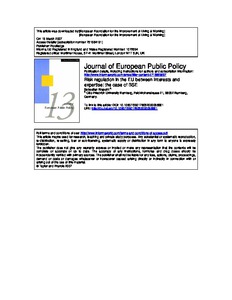Risk regulation in the EU between interests and expertise : the case of BSE

Journal of European Public Policy
2003
10
2
189-207
bovine spongiform encephalopathy ; decision making ; EU Regulation ; risk assessment
Risk assessment and risk management
http://dx.doi.org/10.1080/1350176032000058991
English
Bibliogr.
"This article analyses decision-making within the EU's committee system for BSE regulations during the latest phase of the mad cow scandal between Spring 2000 and Spring 2001. As the empirical analysis shows, the two concepts which dominate the academic discussion - the principal-agent theory and the concept of deliberative supranationalism - each focus on different committees within this complex institutional framework. While the principal-agent theory emphasizes the intergovernmental character of oversight committees, the concept of deliberative supranationalism stresses the supranational character of scientific committees. However, this article demonstrates that there is a differentiation within the decision-making system and a functional division of labour between the different kinds of committees. The oversight committees fulfil the control function in the interests of the member states, whereas the scientific committees advise the Commission during the policy formulation process. Under specific circumstances the scientific committees gain significant influence over the decisions in the oversight committees and, thereby, on the final policy outcome. In this way, the different committees help to increase the EU's problem-solving capacity. "
Digital
The ETUI is co-funded by the European Union. Views and opinions expressed are however those of the author(s) only and do not necessarily reflect those of the European Union or the ETUI.